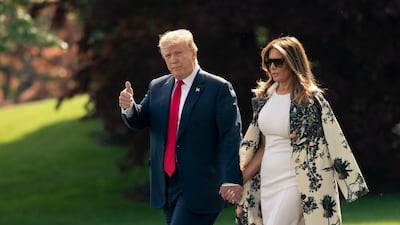In a first, the White House announced on Friday that US President Donald Trump held a phone conversation on Monday with Libyan military commander Field Marshal Khalifa Haftar, as his forces advance into the capital Tripoli.
Mr Trump’s call, disclosed four days later after it occurred, came amidst increasing US discussions with regional allies and France on the unfolding situation in Libya.
“President Donald J. Trump spoke on April 15, 2019, with Field Marshal Khalifa Haftar to discuss ongoing counterterrorism efforts and the need to achieve peace and stability in Libya,” the White House statement read.
It added that Mr Trump “recognised Field Marshal Haftar’s significant role in fighting terrorism and securing Libya’s oil resources, and the two discussed a shared vision for Libya’s transition to a stable, democratic political system.”
The statement was seen as a signal of support from Washington to the Libyan General seeking control over Tripoli and later followed by similar sentiment by US acting defense secretary Patrick Shanahan. Speaking at the Pentagon, Mr Shanahan said “what I do support is Field Marshal Haftar's support in terms of his role in counterterrorism”. He insisted, however, that “a military solution is not what Libya needs.” “Where we need Field Marshal Haftar's support is in building democratic stability there in the region,” he said.
US Secretary of State Mike Pompeo called his French counterpart Jean-Yves Le Drian to discuss Libya among other issues on Thursday. He also met with UAE’s Minister of Foreign Affairs and International Cooperation Sheikh Abdullah bin Zayed Al Nahyan on Thursday and discussed the evolving situations in Yemen, Libya and Sudan.
The situation in Libya was also on the agenda earlier this month during the visit of Egyptian President Abdel Fattah Al Sisi to the White House. Mr Sisi received the Libyan army commander shortly after that visit in Cairo.
It remains unclear, however, what strategy the US is seeking in Libya. On Thursday at the United Nations, both the “United States and Russia said they could not support a United Nations Security Council resolution calling for a ceasefire in Libya at this time,” according to Reuters.
This comes at a time of growing international deliberations over recognising Field Marshal Haftar as the de facto ruler of Libya after years of disarray. However concerns remain over the loss of life as fighting continues.
THE BIO
Ms Davison came to Dubai from Kerala after her marriage in 1996 when she was 21-years-old
Since 2001, Ms Davison has worked at many affordable schools such as Our Own English High School in Sharjah, and The Apple International School and Amled School in Dubai
Favourite Book: The Alchemist
Favourite quote: Failing to prepare is preparing to fail
Favourite place to Travel to: Vienna
Favourite cuisine: Italian food
Favourite Movie : Scent of a Woman
La Mer lowdown
La Mer beach is open from 10am until midnight, daily, and is located in Jumeirah 1, well after Kite Beach. Some restaurants, like Cupagahwa, are open from 8am for breakfast; most others start at noon. At the time of writing, we noticed that signs for Vicolo, an Italian eatery, and Kaftan, a Turkish restaurant, indicated that these two restaurants will be open soon, most likely this month. Parking is available, as well as a Dh100 all-day valet option or a Dh50 valet service if you’re just stopping by for a few hours.
Our legal consultant
Name: Hassan Mohsen Elhais
Position: legal consultant with Al Rowaad Advocates and Legal Consultants.
more from Janine di Giovanni
Know your cyber adversaries
Cryptojacking: Compromises a device or network to mine cryptocurrencies without an organisation's knowledge.
Distributed denial-of-service: Floods systems, servers or networks with information, effectively blocking them.
Man-in-the-middle attack: Intercepts two-way communication to obtain information, spy on participants or alter the outcome.
Malware: Installs itself in a network when a user clicks on a compromised link or email attachment.
Phishing: Aims to secure personal information, such as passwords and credit card numbers.
Ransomware: Encrypts user data, denying access and demands a payment to decrypt it.
Spyware: Collects information without the user's knowledge, which is then passed on to bad actors.
Trojans: Create a backdoor into systems, which becomes a point of entry for an attack.
Viruses: Infect applications in a system and replicate themselves as they go, just like their biological counterparts.
Worms: Send copies of themselves to other users or contacts. They don't attack the system, but they overload it.
Zero-day exploit: Exploits a vulnerability in software before a fix is found.
UAE%20Warriors%20fight%20card
%3Cp%3EMain%20Event%0D%3A%20Catchweight%20165lb%0D%3Cbr%3EMartun%20Mezhulmyan%20(ARM)%20v%20Acoidan%20Duque%20(ESP)%0D%3Cbr%3ECo-Main%20Event%0D%3A%20Bantamweight%0D%3Cbr%3EFelipe%20Pereira%20(BRA)%20v%20Azamat%20Kerefov%20(RUS)%0D%3Cbr%3EMiddleweight%0D%3Cbr%3EMohamad%20Osseili%20(LEB)%20v%20Amir%20Fazli%20(IRN)%0D%3Cbr%3ECatchweight%20161%20lb%0D%3Cbr%3EZhu%20Rong%20(CHI)%20vs.%20Felipe%20Maia%20(BRA)%0D%3Cbr%3ECatchweight%20176%20lb%0D%3Cbr%3EHandesson%20Ferreira%20(BRA)%20vs.%20Ion%20Surdu%20(MDA)%0D%3Cbr%3ECatchweight%20168%20lb%0D%3Cbr%3EArtur%20Zaynukov%20(RUS)%20v%20Sargis%20Vardanyan%20(ARM)%0D%3Cbr%3EFeatherweight%0D%3Cbr%3EIlkhom%20Nazimov%20(UZB)%20v%20Khazar%20Rustamov%20(AZE)%0D%3Cbr%3EBantamweight%0D%3Cbr%3EJalal%20Al%20Daaja%20(JOR)%20v%20Mark%20Alcoba%20(PHI)%0D%3Cbr%3ELightweight%0D%3Cbr%3EJakhongir%20Jumaev%20(UZB)%20v%20Dylan%20Salvador%20(FRA)%0D%3Cbr%3ECatchweight%20143%20lb%0D%3Cbr%3EHikaru%20Yoshino%20(JPN)%20v%20Djamal%20Rustem%20(TUR)%0D%3Cbr%3EFeatherweight%0D%3Cbr%3EJavohir%20Imamov%20(UZB)%20v%20Ulan%20Tamgabaev%20(KAZ)%0D%3Cbr%3ECatchweight%20120%20lb%0D%3Cbr%3ELarissa%20Carvalho%20(BRA)%20v%20Elin%20Oberg%20(SWE)%0D%3Cbr%3ELightweight%0D%3Cbr%3EHussein%20Salem%20(IRQ)%20v%20Arlan%20Faurillo%20(PHI)%3C%2Fp%3E%0A
More on animal trafficking
How to volunteer
The UAE volunteers campaign can be reached at www.volunteers.ae , or by calling 800-VOLAE (80086523), or emailing info@volunteers.ae.
Zidane's managerial achievements
La Liga: 2016/17
Spanish Super Cup: 2017
Uefa Champions League: 2015/16, 2016/17, 2017/18
Uefa Super Cup: 2016, 2017
Fifa Club World Cup: 2016, 2017
COMPANY%20PROFILE
%3Cp%3E%3Cstrong%3ECompany%20name%3A%3C%2Fstrong%3E%20Revibe%20%0D%3Cbr%3E%3Cstrong%3EStarted%3A%3C%2Fstrong%3E%202022%0D%3Cbr%3E%3Cstrong%3EFounders%3A%3C%2Fstrong%3E%20Hamza%20Iraqui%20and%20Abdessamad%20Ben%20Zakour%20%0D%3Cbr%3E%3Cstrong%3EBased%3A%3C%2Fstrong%3E%20UAE%20%0D%3Cbr%3E%3Cstrong%3EIndustry%3A%3C%2Fstrong%3E%20Refurbished%20electronics%20%0D%3Cbr%3E%3Cstrong%3EFunds%20raised%20so%20far%3A%3C%2Fstrong%3E%20%2410m%20%0D%3Cbr%3E%3Cstrong%3EInvestors%3A%20%3C%2Fstrong%3EFlat6Labs%2C%20Resonance%20and%20various%20others%0D%3C%2Fp%3E%0A
Essentials
The flights
Emirates and Etihad fly direct from the UAE to Geneva from Dh2,845 return, including taxes. The flight takes 6 hours.
The package
Clinique La Prairie offers a variety of programmes. A six-night Master Detox costs from 14,900 Swiss francs (Dh57,655), including all food, accommodation and a set schedule of medical consultations and spa treatments.
The specs
Engine: Dual 180kW and 300kW front and rear motors
Power: 480kW
Torque: 850Nm
Transmission: Single-speed automatic
Price: From Dh359,900 ($98,000)
On sale: Now
UAE currency: the story behind the money in your pockets
Western Region Asia Cup T20 Qualifier
Sun Feb 23 – Thu Feb 27, Al Amerat, Oman
The two finalists advance to the Asia qualifier in Malaysia in August
Group A
Bahrain, Maldives, Oman, Qatar
Group B
UAE, Iran, Kuwait, Saudi Arabia
Shipping%20and%20banking%20
%3Cp%3EThe%20sixth%20sanctions%20package%20will%20also%20see%20European%20insurers%20banned%20from%20covering%20Russian%20shipping%2C%20more%20individuals%20added%20to%20the%20EU's%20sanctions%20list%20and%20Russia's%20Sberbank%20cut%20off%20from%20international%20payments%20system%20Swift.%3C%2Fp%3E%0A
